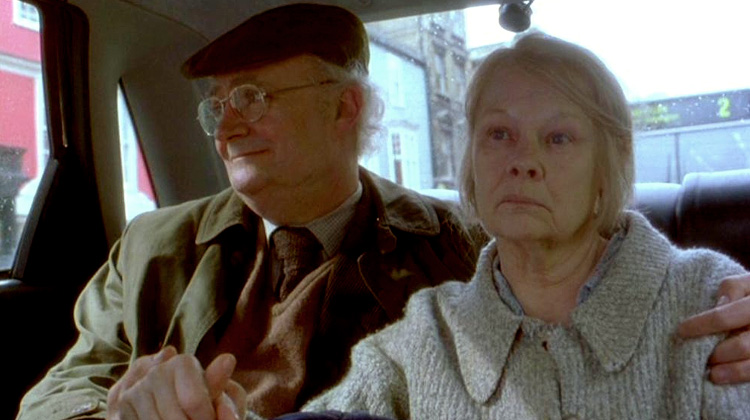Jim Broadbent, born on 24th May 1949 in Lincoln, England, is a celebrated British actor renowned for his versatility and distinctive presence on both screen and stage. His extensive career, marked by a blend of comedic brilliance and dramatic depth, has established him as one of Britain’s most beloved and respected actors.
Broadbent’s early life was steeped in the arts. His parents were involved in amateur theatre, which undoubtedly influenced his passion for acting. He honed his craft at the London Academy of Music and Dramatic Art (LAMDA), graduating in 1972. This formal training laid a solid foundation for his future endeavours.
Broadbent’s career began in theatre, where his performances garnered critical acclaim. His transition to film and television was seamless, with his natural talent allowing him to excel across various genres. One of his earliest significant roles was in the 1980 film “Breaking Glass,” but it was his portrayal of W.S. Gilbert in “Topsy-Turvy” (1999) that brought him wider recognition. His performance earned him the BAFTA Award for Best Actor in a Supporting Role.
Broadbent’s ability to embody diverse characters has led to a series of unforgettable roles. In 2001, he won the Academy Award for Best Supporting Actor for his role as John Bayley in “Iris,” a poignant depiction of Iris Murdoch’s battle with Alzheimer’s. That same year, he charmed audiences as Harold Zidler in “Moulin Rouge!,” showcasing his dynamic range.
Beyond his award-winning performances, Broadbent has been a familiar face in several blockbuster franchises. He delighted children and adults alike as Professor Horace Slughorn in the “Harry Potter” series and brought gravitas to the role of Archmaester Ebrose in “Game of Thrones.”
Despite his success, Broadbent remains grounded and dedicated to his craft. He continues to work in both independent films and major productions, effortlessly shifting between leading and supporting roles. His performances are marked by a rare combination of warmth, wit, and profundity, making each character he portrays memorable.
Broadbent’s contributions to the arts have been recognised with numerous honours, including a BAFTA Fellowship in 2019, celebrating his outstanding career in cinema. His enduring legacy is a testament to his exceptional talent and unwavering dedication to the performing arts.
Shortly after winning his Best Supporting Actor Oscar for his role in “Iris” (2001), Jim Broadbent was interviewed by Joan Rivers, who apparently didn’t even know what nationality he was. On live TV, Rivers said, “Here we have Jim Broadbent, all the way from Australia. You’re Australian aren’t you?” But there were to be no tantrums from the star – the mild-mannered actor replied, “No, I’m British.”

How British is he? So British that…
“I was offered an OBE a couple of years ago, but I said, ‘no’, and turned it down. I’m not that comfortable with actors receiving honors, partly because I think they ought to go to those who really help others. Besides, I like the idea of actors not being part of the Establishment. We’re vagabonds and rogues, and we’re not a part of the authorities and Establishment, really. If you mix the two together, things get blurry.”
“I didn’t think I deserved it, really. And also my father died when I was 22 and he was quite an anarchic spirit, and he would have been proud of me to have turned it down. You know how it is, the usual line: ‘Oh, I accepted it for my parents.’ Whereas I turned it down for my parents.”
In the words of John Ruskin:
The highest reward for a person’s toil is not what they get for it, but what they become by it.
Who was Iris Murdoch?
Iris Murdoch, born Jean Iris Murdoch on July 15, 1919, in Dublin, Ireland, was a prolific British novelist and philosopher known for her profound exploration of moral and ethical questions. She was the only child of Wills John Hughes Murdoch, a civil servant, and Irene Alice Richardson, a singer. The family moved to London when Iris was very young. Murdoch’s early education was at the Froebel Demonstration School and Badminton School, followed by her studies at Somerville College, Oxford, where she read classics, ancient history, and philosophy, graduating with first-class honors in 1942.
After graduating from Oxford, Murdoch worked in various capacities during World War II, including a stint at the Treasury and later with the United Nations Relief and Rehabilitation Administration. Her philosophical journey continued at Cambridge, where she attended lectures by Ludwig Wittgenstein and absorbed existentialist and analytic philosophy currents. She later taught philosophy at St Anne’s College, Oxford, influencing a generation of students with her teachings and writings.
Murdoch’s first novel, Under the Net (1954), is often hailed as one of her best works. It introduces themes that recur throughout her oeuvre: the complexity of human relationships, the quest for meaning, and the influence of philosophy on daily life. Under the Net was followed by a series of novels that cemented her reputation as a formidable literary figure. Her writing is characterized by intricate plots, deep philosophical musings, and richly drawn characters.
Notable Works
- The Bell (1958): This novel explores religious faith, community life, and personal transformation within the setting of an Anglican lay community.
- A Severed Head (1961): A darkly comic tale that delves into psychoanalysis, sexuality, and the absurdity of human desires.
- The Black Prince (1973): A meta-narrative on love, jealousy, and artistic creation, reflecting Murdoch’s fascination with Shakespearean themes.
- The Sea, The Sea (1978): Winner of the Booker Prize, this novel is a meditation on the nature of art, memory, and self-deception, set against the backdrop of a retired actor’s life by the sea.
Murdoch’s contributions to philosophy are significant, particularly her works on moral philosophy and the concept of goodness. Her major philosophical works include:
- Sartre: Romantic Rationalist (1953): A critical study of Jean-Paul Sartre’s existentialism.
- The Sovereignty of Good (1970): A collection of essays that argue for the primacy of the Good in moral philosophy, countering the trends of existentialism and behaviorism.
- Metaphysics as a Guide to Morals (1992): A comprehensive exploration of how metaphysical ideas can inform ethical thinking.
Murdoch married John Bayley, a fellow writer and literary critic, in 1956. Their marriage was characterised by intellectual companionship and mutual support, though it also faced challenges due to Murdoch’s extramarital affairs and Bayley’s struggle with jealousy. The couple remained together until Murdoch’s death.
In the 1990s, Murdoch began to suffer from Alzheimer’s disease, which gradually robbed her of her remarkable intellect and creativity. Her struggle with the disease and its impact on her life and work was poignantly captured by Bayley in his memoir Elegy for Iris, later adapted into the film Iris (2001), starring Judi Dench and Kate Winslet.
Murdoch passed away on February 8, 1999, but her legacy endures through her extensive body of work. Her novels continue to be read and celebrated for their philosophical depth and narrative complexity. As both a novelist and philosopher, Iris Murdoch remains a towering figure in 20th-century literature and thought, celebrated for her unique ability to blend storytelling with rigorous ethical inquiry.
KEEP US ALIVE and join us in helping to bring reality and decency back by SUBSCRIBING to our Youtube channel: https://www.youtube.com/channel/UCQ1Ll1ylCg8U19AhNl-NoTg AND SUPPORTING US where you can: Award Winning Independent Citizen Media Needs Your Help. PLEASE SUPPORT US FOR JUST £2 A MONTH https://dorseteye.com/donate/







